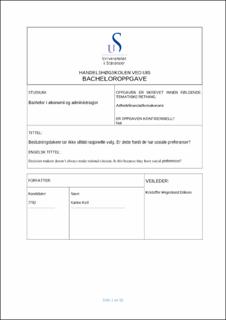Beslutningstakere tar ikke alltid rasjonelle valg. Er dette fordi de har sosiale preferanser?
Bachelor thesis
Permanent lenke
https://hdl.handle.net/11250/2773156Utgivelsesdato
2021Metadata
Vis full innførselSamlinger
- Studentoppgaver (Business) [1035]
Sammendrag
Denne oppgaven presenterer resultatene knyttet til et hypotetisk eksperiment som ser på fordeling i et gi- og ta-spill hvor den ene spilleren har all makt. Tidligere forskning har vist at generøsitet i diktatorspill kan skyldes sosiale preferanser. Formålet med det hypotetiske eksperimentet var å observere om generøsitet i diktatorspill endres når den ene spilleren får mulighet til å gi til den andre, og når den ene spilleren får mulighet til å ta av den andre. I tillegg ønsket jeg å se på om generøsiteten endret seg når utgangspunktet til spillerne endret seg. Jeg endret utgangspunktet ved å endre på andelen som hver av spillerne hadde av den totale summen.
I det hypotetiske eksperimentet ble det utformet fire spill, to gi-spill og to ta-spill. Spillerne i de individuelle spillene fikk så tildelt en gitt sum med penger, hvor den ene spilleren fikk tildelt betydelig mindre enn den andre. Denne summen varierte fra spill til spill. Spilleren med makt fikk muligheten til å allokere summen med penger mellom de to spillerne, enten ved å gi eller å ta.
Det hypotetiske eksperimentet ga følgende hovedresultater: Deltakerne var i all hovedsak generøse med hverandre, dette vil si at de ønsket å dele med den andre spilleren. Videre endret generøsiteten seg når man gikk fra gi-spill til ta-spill. På den måten at den andre spilleren satt igjen med en større andel i ta-spillene enn i gi-spillene. Generøsiteten endret seg også når utgangspunktet endret seg. Deltakerne var mer generøse i gi-spill hvor den andre spilleren i utgangspunktet ikke hadde noe, enn hvor den andre spilleren hadde noe. I tillegg var deltakerne mer generøse i ta-spill hvor den andre spilleren hadde noe i utgangspunktet, enn hvor den andre spilleren ikke hadde noe. This theses presents results in a hypothetical experiment that looks at distribution in a give-and-take game where one player has all the power. Previous research has shown that generosity in dictator-games may be due to social preferences. The purpose of the hypothetical experiment was to observe whether generosity in dictator-game changes when one player is given the opportunity to give to the other, and when one player is given the opportunity to take from the other. In addition, I wanted to look at whether the generosity changed when the starting point of the players changed. I changed the starting point by changing the proportion that each of the players had of the total sum.
Four games were designed in the hypothetical experiment; two giving-games and two taking-games. The players in the individual games were then given a sum of money, with one player being given less than the other. This sum varies from game to game. The player with power was given the opportunity to allocate the sum of money between the two players, either by giving or taking.
The hypothetical experiment gave the following main results: The participants were essentially generous with each other, that is, they wanted to share with the other player. Furthermore, the generosity changed when one went from giving-game to taking-game. In the way that the other player was left with a larger share in the take games than in the give games. Generosity also changed when the starting point changed. Participants were more generous in giving games where the other player initially had nothing, than where the other player had something. In addition, participants were more generous in taking-games where the other player had something in the beginning, than where the other player had nothing.
